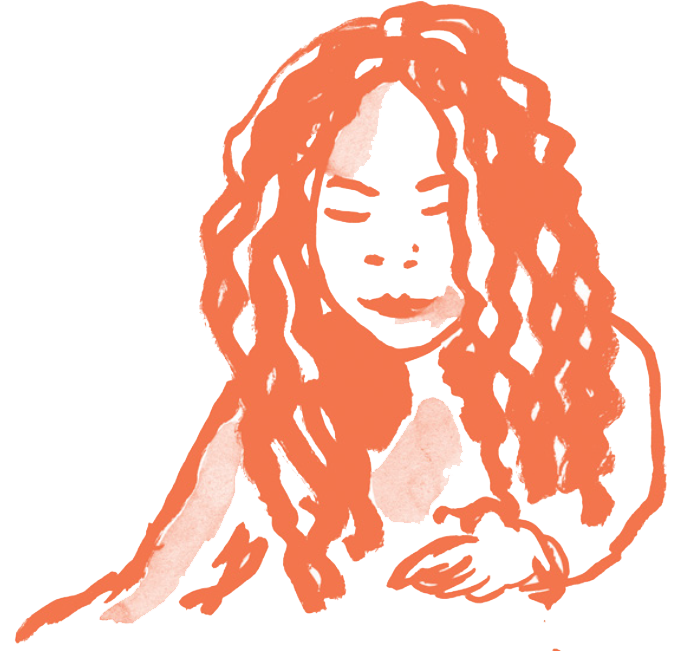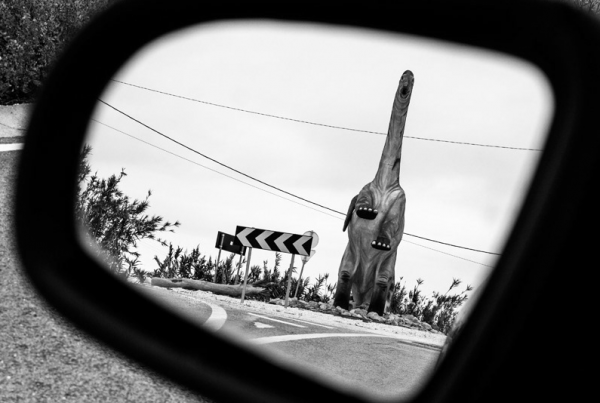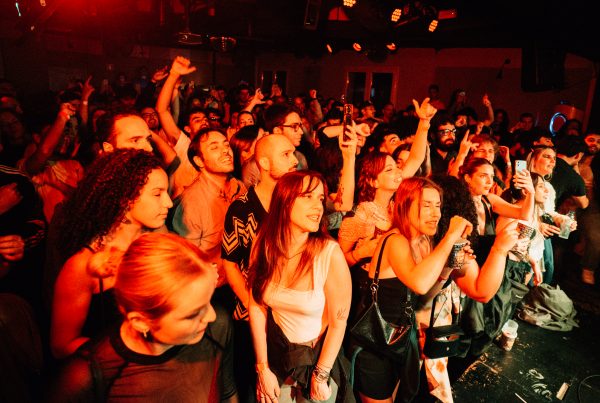
Yewande Adeniran (aka Ifeoluwa) is the founder of INTERVENTION DJ Workshops, a DJ / radio host and freelance music journalist for The Wire, Mixmag, The Quietus and Resident Advisor.
Enquanto crescia em Inglaterra, existia silêncio em torno da saúde mental. Uma pessoa era vista como maluca e anormal, alguém de quem as pessoas deviam manter a distância. Apesar de ter vivido uma depressão desde muito jovem, guardei-a para mim e aceitei que esse sofrimento psicológico era apenas algo com o qual tinha de viver. A televisão, os filmes e a música representavam o artista deprimido e angustiado como um génio criativo anónimo, para quem a sociedade não estava preparada. Foi só quando a ansiedade me atingiu aos 16 anos que percebi a complexidade da saúde mental. Não conseguia entrar em transportes públicos, concentrar-me nas aulas ou comer de forma adequada. Todas as idas ao médico tornavam-se uma tarefa ingrata, uma viagem rotineira carregada de frustração.
Quando se começou a falar sobre saúde mental, a discussão focou-se nos aspectos mais apetecíveis da doença. Se não se dava ainda a devida atenção às pessoas neurodivergentes, muito menos se dava àquelas que não eram brancas, heterossexuais, cisgéneras ou capazes de suportar os custos do tratamento para os diferentes transtornos da saúde mental. Neste contexto, a nossa necessidade de fuga torna-se cada vez mais angustiante, com a ênfase colocada na libertação da dor. Fetichizamos o sofrimento e romantizamos o abuso de substâncias. Os nossos corpos não são concebidos para suportar tais abusos e as nossas mentes são ainda mais frágeis. A música de dança é o produto da resposta de sujeitxs negrxs e latinxs à heteronormatividade branca. É activismo na sua forma sonora, mas aquilo a que assistimos hoje é completamente diferente do que era nas suas origens. Existir em espaços de música enquanto pessoa marginalizada pode ser alienador. Consumir a produção artística de sujeitxs queer não brancxs, enquanto se repudia a sua existência física, é violento. Mas o sofrimento não precisa de estar presente na arte para reflectir quem somos.
Criar comunidades onde aqueles que se sentem oprimidos se sintam seguros e bem-vindos é crucial para desafiar esta realidade. Sem descanso para te restabeleceres das constantes micro e macro agressões, a tua saúde mental ressente-se e, rapidamente, pode passar de um estado dificilmente controlável para uma necessidade de cuidados urgentes. Devido às barreiras estruturais que xs sujeitxs marginalizadxs enfrentam, é nosso dever assegurar que fazemos tudo o que podemos para impedir que as pessoas sejam ignoradas. Ser DJ é estar num ambiente único onde, por vezes, te permites entregar a substâncias ilegais e onde és o centro das atenções. És responsável pelo divertimento do público, uma pressão que pode causar um enorme stress. Juntando a isso a falta de sono e os implacáveis horários das digressões, torna-se difícil manteres, em todas as ocasiões, o foco das atenções virado para ti sem uma pequena “ajuda”. É fácil entrares em delírio, sobretudo quando a tua hipervisibilidade expõe a tua “diferença”. O álcool e as drogas podem entorpecer temporariamente a ansiedade ou servir como um catalisador de energia, mas com o tempo, à medida que se transformam num vício, perdem o seu efeito.
Teoricamente, as políticas de espaço seguro são uma excelente ideia, definindo claramente um conjunto de regras que, embora óbvio, cada espectador tem de cumprir. Com isto em mente, assumir-se-ia que o assédio sexual, o abuso verbal e agressões de diferentes naturezas seriam uma ocorrência rara, mas infelizmente não é o caso. Para combatermos este problema, precisamos de acção directa. Imediatamente. Para que a nossa segurança e felicidade deixem de ser comprometidas. Priorizemos as vozes silenciadas, encorajemos aqueles que são alienados e ignorados. Temos de educar, resistir e cicatrizar juntos para que os espaços que criamos sejam seguros. Podemos fazê-lo através de workshops para partilhar competências, através de zonas de bem-estar onde as pessoas simplesmente existam sem expectativas e através da criação de mais eventos sóbrios, de forma a que se tire a ênfase das drogas e do álcool. Foi por isso que eu criei a INTERVENTION, um espaço onde mulheres, sujeitxs LGBT+, não brancxs e pessoas neurodivergentes possam reunir-se e aprender a ser DJ e a produzir música. Quanto mais priorizarmos a nossa saúde de forma holística, mais fácil será sobreviver nestes espaços e criar arte.
É aqui que o apoio de agentes, managers e promotores é crucial. Pode não ser fácil reconhecer quando alguém se encontra à beira de uma espiral descendente. Para quem está de fora, tudo parece estar bem. As tuas performances são bem recebidas, os teus álbuns vendem e estás a fazer dinheiro para sobreviver – ou seja, reúnes todos os indicadores de sucesso numa sociedade neoliberal. Mas aqueles que trabalham contigo todos os dias têm uma visão mais objectiva da situação. São as pessoas responsáveis pelos teus riders e por assegurar a tua segurança. Têm o poder de influenciar o teu consumo de álcool e de drogas enquanto estás a actuar. Em coordenação com os agentes e managers dos artistas, é necessário conciliar cuidados de saúde. É necessário tornar obrigatórios check-ups periódicos com profissionais de saúde mental, sobretudo para aqueles que já têm condições preexistentes. A introdução de procedimentos específicos ajudaria a sensibilizar e a reduzir o estigma e a romantização à volta deste tópico, permitindo aos promotores sentirem-se mais confortáveis em propor hábitos de entretenimento mais saudáveis. Em prol de um futuro livre de sofrimento, temos de nos proteger uns aos outros, custe o que custar.
/ Tradução por Marta Gamito
English Version
If we continue to lose the life of the party, who’s left?
Growing up in England, there was silence around mental health. You were seen as a freak, a weirdo, someone people should stay away from. Even though I had been experiencing depression from a very young, I kept it to myself and accepted that psychological suffering was just something I had to live with. Television, films and music depicted the lone angst ridden depressed artist as an unsung creative genius that society isn’t ready for. It wasn’t until anxiety hit me at aged 16 that I understood how complex mental health is. I couldn’t get on public transport, focus in class or eat properly. Every doctors visit became a chore, an uneventful trip filled with disappointment.
When we first started discussing mental health, it was focusing around the more palatable conditions. Full attention was yet to be given to neurodivergent souls, let alone those who are not white, straight, cisgender or able to afford treatment for various mental health conditions. With this in mind, our reasons to escape become more and more pressing, with emphasis placed on releasing pain. We fetishise suffering and romanticise substance abuse. It becomes the norm to continue the party for days on end, hoping to never have to live in reality again. Our physical body is not designed to withstand such abuse and our minds are even more fragile. Dance music is the product of Black and Latinx individuals response to white heteronormativity. It is activism in its sonic form, but what we see today is starkly different from its origins. Existing in music spaces as a marginalised individual can be alienating. Consuming the artistic outputs of queer people of colour, whilst dismissing their physical existence, is violent. But suffering doesn’t need to be a part of art for it to reflect who we are.
Creating communities where those who are oppressed can feel safe and welcome is key in challenging this. Without a respite from navigating constant micro and macro aggressions, your mental health takes a toll and can quickly escalate from barely manageable to in need of urgent care. Due to structural barriers marginalised folxs experience, it is our duty to ensure that we do whatever we can to prevent people from falling through the cracks. DJing is a unique environment where you indulge in sometimes illegal substances and you are put on a center stage. You are responsible for the crowd’s enjoyment, a pressure that can cause immense stress, and couple that with lack of sleep and relentless touring schedules – it’s hard to remain the center of attention at every event without a little “help”. It’s easy to get lost in the sauce, especially when your hypervisibility displays your “otherness”. Alcohol and drugs can temporarily numb the anxiety or serve as an energy booster, but over time it loses its effect as it becomes an addiction.
Theoretically, safe space policies are an excellent idea. A clearly defined, albeit obvious, set of rules that each attendee at events has to abide by. With this in mind, you would think that sexual harassment, assaults of various natures and verbal abuse would be a rare occurrence, but unfortunately this is not the case. In order to tackle this issue, we need direct action. Immediately. To stop compromising on our safety and happiness. To prioritise voices that are silenced, uplift those who are alienated and dismissed. We have to educate, resist and heal together so that the spaces we create are safe. We can do this through workshops to share skills, chill out zones where people just exist without expectations, and more sober events, so an emphasis is taken away from drugs and alcohol. This is why I created INTERVENTION, a space where womxn, LGBT+ folxs, people of colour and neurodivergent individuals can come together and learn how to DJ and produce music. The more we holistically prioritise our health, the easier it will be to survive in these spaces and create art.
This is where the support of agents, managers and promoters is crucial. It can be hard to notice when you’re at the beginning of a downward spiral. From the outside, everything seems fine. Your performances are well received, your records sell and you’re making money to survive – all markers of success in a neoliberal society. But those working with you every day have a more objective view on the situation. These are the people responsible for your riders and for ensuring your safety. They have the power to influence your consumption of alcohol and drugs while you’re performing. In liaison with artists’ agents and managers, healthcare provisions need to be in place. Regular check-ups with mental health professionals need to be mandatory, and for those with pre-existing conditions, even more so. Introducing specific guidelines would help to raise awareness and reduce stigma and the glamorization surrounding this sensitive topic, allowing for promoters to feel more comfortable moving towards healthier partying habits. In order for a future that is free from suffering, we have to protect each other at all costs.



